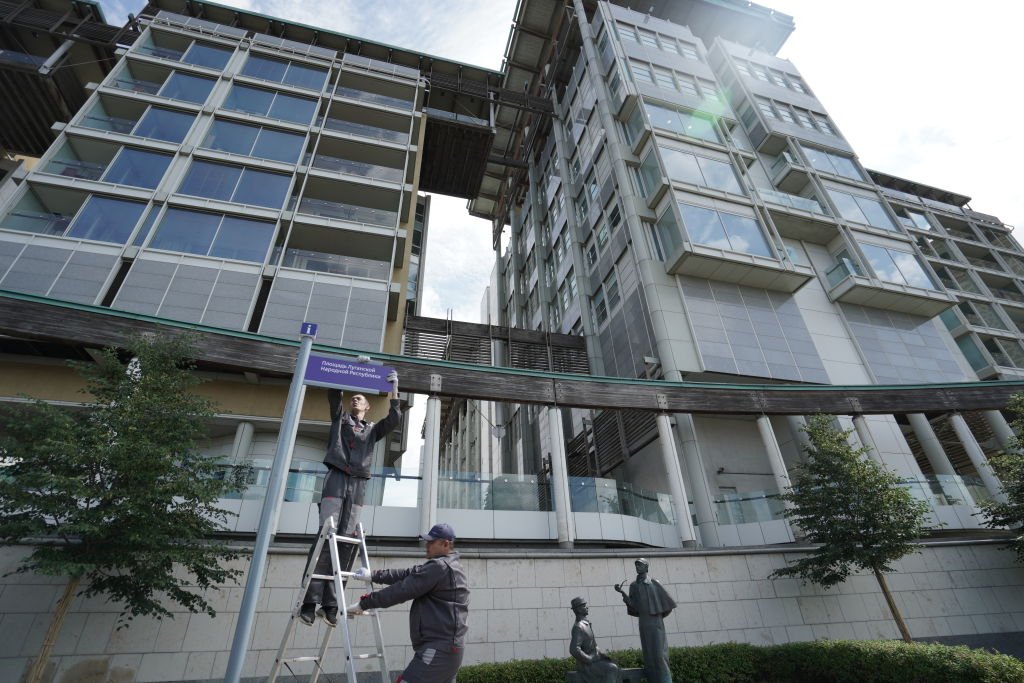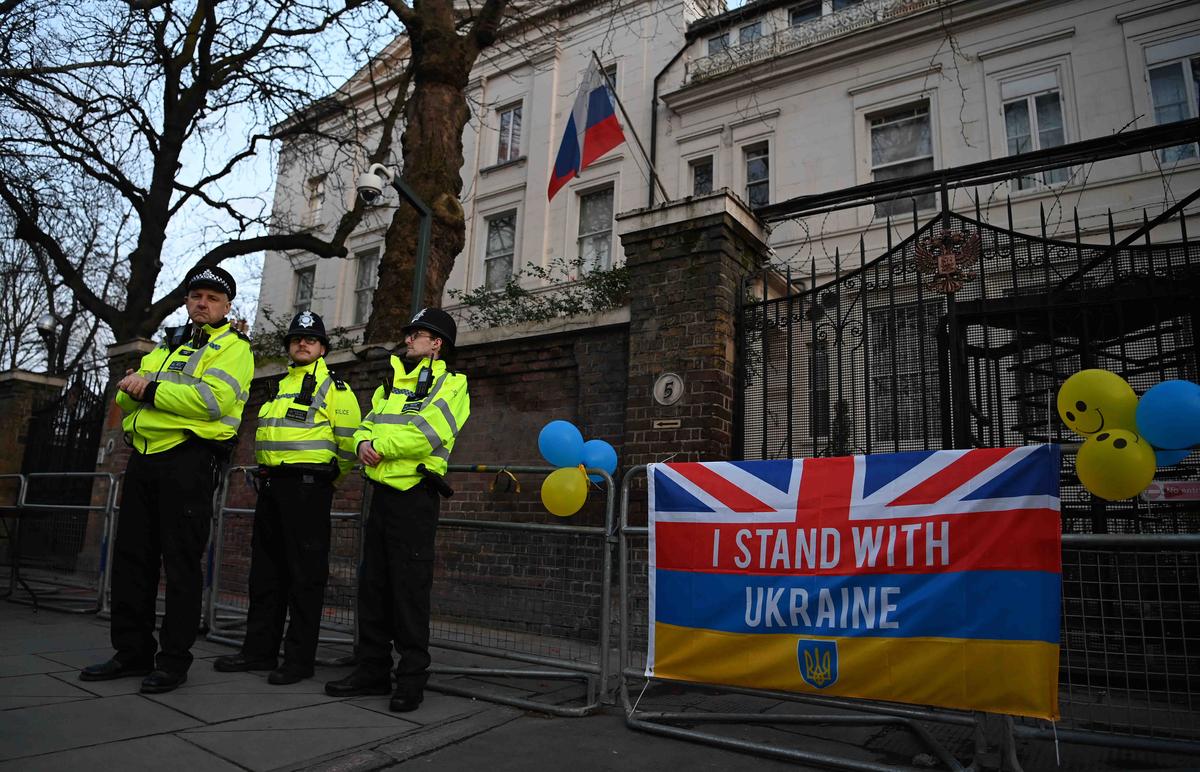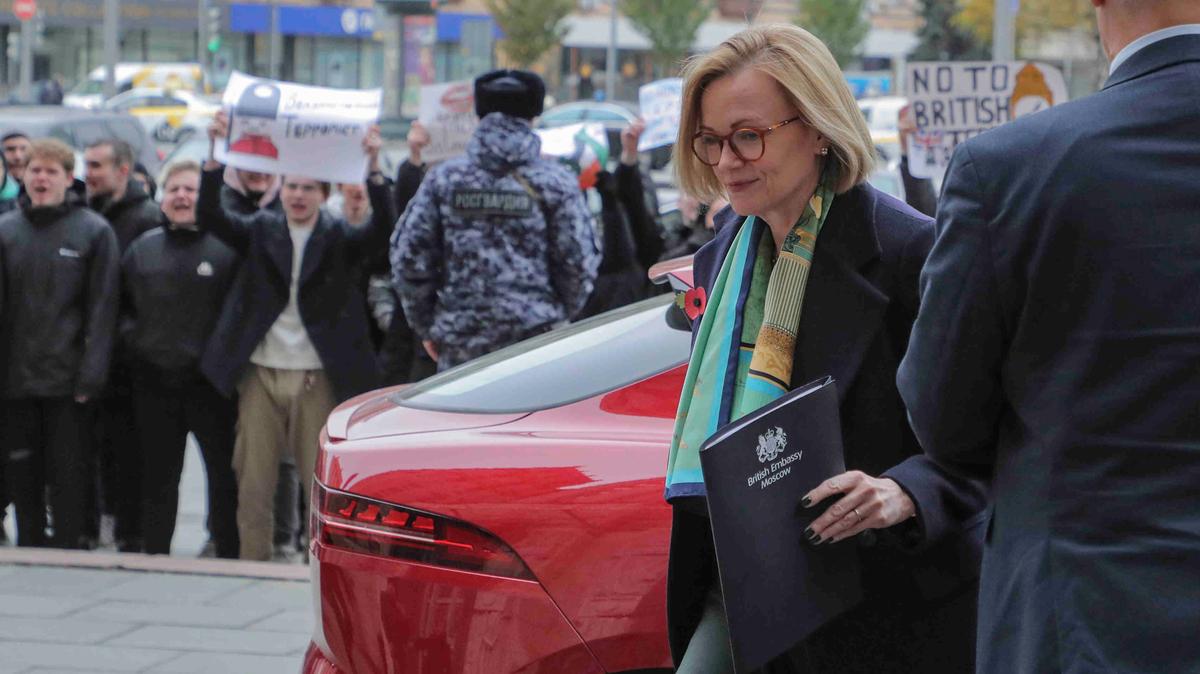Dame Deborah Bronnert’s tenure as the United Kingdom’s ambassador to Moscow began with an unprecedented global pandemic and has come to an end amid a post-Cold War nadir in Anglo-Russian relations. Before leaving Moscow this week, Bronnert discussed ties between the two countries in light of the war in Ukraine with Novaya Gazeta Europe’s editor-in-chief Kirill Martynov.
KM: Where do diplomatic relations between London and Moscow stand today?
DB: Russia’s full-scale invasion of Ukraine has put an already difficult relationship under huge strain. We knew about Russia’s plans in advance and tried to persuade the Russian state not to invade, including the then Foreign Secretary and Defence Secretary when they visited Moscow in early 2022, and calls between the then [British] prime minister and President Putin, as well as conversations my team and I had with our contacts in Russia. We told Russia that we would support Ukraine to defend itself and that there would be consequences for Russia if it went ahead with the invasion. It is a tragedy for Russia, Ukraine and the wider world that President Putin chose war over diplomacy.
At times of tension, it is very important to maintain channels for dialogue, so despite our profound differences we continue to communicate directly with the Russian government via the embassy.
Of course, we hope for a better future when we can again work together on important issues, such as climate change. But Russia needs to stop its aggression against Ukraine and respect international borders.

Посольство Великобритании в Москве. Фото: Pelagiya Tihonova / Anadolu Agency / Getty Images
KM: Are there any points of common ground between our countries, such as humanitarian issues?
DB: Before Russia’s invasion of Ukraine, we worked together on a range of issues where our interests coincided: for example, in 2021 we commemorated together in Arkhangelsk 80 years of the launch of the Arctic convoys, when the UK, along with other allies, sent vital supplies to the Soviet Union. The convoys supplied about a quarter of supplies required by the Soviet Army in our joint fight to defeat Nazi Germany.
We know that British and Russian people admire one another’s culture, whether it is Shakespeare, Harry Potter, Tchaikovsky or Chekhov. Recently, the embassy took part in the European Languages Day event at Moscow State University and more than 300 Russians of different backgrounds, ethnicities and ages spoke to us about the UK’s film, literature, arts and world-class education. Despite everything that’s going on, ordinary Russians are just as interested in learning about Britain, learning English and visiting the UK as they were before the start of the war. British people remain fascinated by Russia and Russian culture. Tchaikovsky’s Swan Lake is the longest-running ballet show in the UK, for example.
KM: Besides the aggression against Ukraine, what are the most pressing issues for the United Kingdom in the current diplomatic crisis?
DB: Russia’s war in Ukraine and the death and destruction that it is causing, not only in Ukraine but in Russia, is the main issue for us. But we also discuss other issues, including human rights and consular cases such as the detention of UK-Russian national Vladimir Kara-Murza who has been sentenced to 25 years in prison.
We have also recently engaged with Russia on the situation in the Middle East, and continue to engage with Russia on critical global issues at the United Nations Security Council, of which we are both permanent members.
KM: How can diplomats carry out their duties in today’s Russia, which is engaged in aggressive warfare? Embassy staff can also be targeted for their foreign connections. Is it possible to secure their safety?
DB: Foreign missions and their staff are protected under international law. Our obligation to our staff is something that we take very seriously. But we continue to raise the very difficult issues of the war in Ukraine in every conversation we have with the Russian government, sending a clear message that the UK and our allies will continue to support Ukraine to defend itself until it succeeds.

Фото: EPA-EFE / ANDY RAIN
KM: If there are no points of common ground, what is the purpose of maintaining diplomatic relations between the United Kingdom and Russia?
As I’ve already said, in many ways, diplomatic channels are even more important during times of difficulty and tension. Apart from the war, there are consular and other essential issues that we engage on. In addition, both the UK and Russia are permanent members of the United Nations Security Council and many other international organisations.
KM: What has been your impression of Russian civil society during your time in Moscow? Are Russians continuing to resist the war, or have they become resigned to it?
DB: I admire the bravery of many Russians who continue to oppose the war and refuse to stay silent. Of course, many Russians have left the country and many are afraid. When I have travelled around Russia, I have seen very little support for the war. I think many Russians feel helpless. Many, of course, will not even know what is really happening following the closure of independent media, and legislation which forbids Russians from speaking the truth about the full scale invasion of Ukraine. I think the authorities’ decision to limit independent information and persecute those who are brave enough to speak out must mean that they are concerned that the Russian population would be horrified if they knew the truth about what is being done in their name.
A vibrant civil society plays a hugely positive and important role everywhere and it has been very sad to follow developments in Russia, where despite safeguards in the Russian Constitution and international commitments that Russia freely entered into, pressure on civil society continues to increase.
KM: What is your view on Russian oligarchic capital finding safe haven in London? Should the UK punish all these individuals, or does a public statement against the war clear a person of suspicion? Are there good examples of refusing to support the war among representatives of the Russian elite?
DB: So there are two issues here: first, the UK takes a very strong position against corruption in all its forms and is acting to make sure that funds coming into the UK are not from corrupt sources. That is why we have recently enacted even tougher legislation against economic crime. The UK’s Economic Crime and Corporate Transparency Act provides huge new powers to tackle the illicit use of shell companies and prevent economic crime before it happens. Prosecutors will be better able to hold large corporations accountable, and courts empowered to dismiss spurious lawsuits that seek to stifle freedom of speech, cracking down on exploitation of the UK’s open economy and levelling the playing field for legitimate businesses to grow and prosper. Of course there is always more to do.
The Transparency International Corruption Perceptions Index currently ranks the UK as number 18 out of 180 countries (1 is the best). Russia is ranked 137.
Second, we have taken action linked directly to Russia’s war in Ukraine. We have sanctioned over 1,600 individuals and entities since the start of the invasion, including 29 banks with global assets worth £1 trillion, 129 oligarchs with a combined net worth of over £145 billion, and over £20 billion worth of UK-Russia trade.
In addition, we have frozen over £18 billion worth of Russian assets under the Russian sanctions regime. These are all assets which can no longer be taken back to Russia to fund Putin’s war machine.
Many Russians, including in the elites, do not support the war and many have said this publicly.
KM: How do you see the future of relations between our countries? What is needed to rebuild trust and return to real diplomatic cooperation?
DB: The outlook at the moment is bleak because of Russia’s invasion of Ukraine, which is in violation of the UN charter and causing terrible suffering. It has weakened Russia at home and abroad: it is not only UK-Russia relations that have been badly damaged by President Putin’s decision to choose war over diplomacy.
Today, the best way to restore relations with us and many others and to improve the prospects for Ukraine and ordinary Russians is for President Putin to stop the war and withdraw Russian troops from Ukraine and respect Ukrainian sovereignty and territorial integrity. Even when it is over, the invasion will cast a shadow for many years, even more reason to stop it now so the task of rebuilding and securing a better future can begin.
Despite the current bleak circumstances, I have hope that a sustainable peace will come. From my conversations with ordinary Russians in Moscow and across Russia, I know that so many Russians are kind-hearted and do not want war and bloodshed. They want a better and more prosperous future for themselves and their children. So I believe that with peace, the UK and Russia can begin to rebuild our relations and work together on the biggest challenges of our time, including fighting climate change and eradicating poverty.
Join us in rebuilding Novaya Gazeta Europe
The Russian government has banned independent media. We were forced to leave our country in order to keep doing our job, telling our readers about what is going on Russia, Ukraine and Europe.
We will continue fighting against warfare and dictatorship. We believe that freedom of speech is the most efficient antidote against tyranny. Support us financially to help us fight for peace and freedom.
By clicking the Support button, you agree to the processing of your personal data.
To cancel a regular donation, please write to [email protected]

